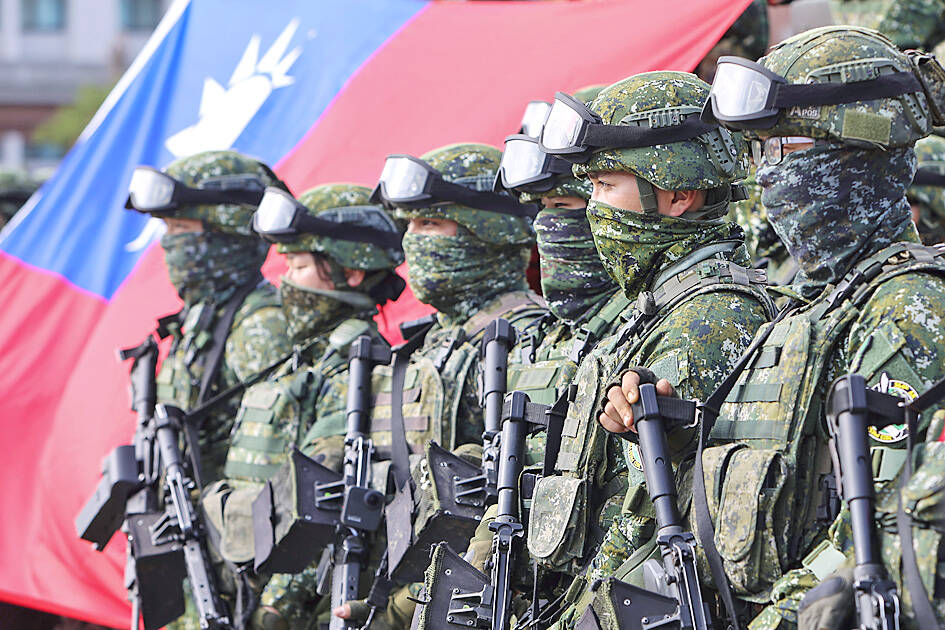Taiwan yesterday told China to stop its “destructive unilateral actions” after more than 100 Chinese warplanes and nine navy ships were detected in areas around the nation.
The Ministry of National Defense (MND) described the number of warplanes detected in 24 hours as a “recent high,” while Beijing has so far refrained from issuing any official comment on the sorties.
“Between the morning of September 17th to 18th, the Ministry of National Defense had detected a total of 103 Chinese aircraft, which was a recent high and has posed severe challenges to the security across the Taiwan Strait and in the region,” it said in a statement.

Photo: Daniel Ceng, AP
Beijing’s “continued military harassment can easily lead to a sharp escalation in tension and worsen regional security,” the ministry said, as it called on China to “immediately stop such destructive unilateral actions.”
Forty of the planes crossed the so-called median line of the Taiwan Strait, and entered Taiwan’s southwest and southeast air defense identification zone (ADIZ), the statement said.
An ADIZ is a self-declared area in which a country claims the right to identify, locate and control approaching foreign aircraft, but is not part of its territorial airspace as defined by international law.
Last week, Taipei also reported an increased number of incursions by Chinese warplanes and ships.
The uptick came as Beijing said its troops were on “high alert” after two ships belonging to the US and Canada sailed through the Taiwan Strait.
The defense ministry said 68 Chinese aircraft and 10 naval vessels were detected around the nation between Wednesday morning and Thursday morning last week.
Analysts said China could be flexing its muscles to counter US influence in the Asia-Pacific region, as it leads multiple rounds of military drills with allies across the region.
“Politically, China aims to counter the military containment of democratic allies led by the United States,” said Su Tzu-yun (蘇紫雲), a research fellow at the government-funded Institute for National Defense and Security Research.
Chieh Chung (揭仲), an associate research fellow at the National Policy Foundation in Taipei, said that July to September is usually the most active time of year for Chinese People’s Liberation Army (PLA) drills, and he suspected that the record 103 warplanes were part of a PLA exercise on the open seas.
Chieh said he did not think the incursions were meant to coincide with the meeting between Chinese Minister of Foreign Affairs Wang Yi (王毅) and US National Security Adviser Jake Sullivan in Malta over the weekend.
If that were the case, it would expose a lack of coordination between China’s foreign affairs and military branches, he said.
Additional reporting by CNA

TRAGEDY STRIKES TAIPEI: The suspect died after falling off a building after he threw smoke grenades into Taipei Main Station and went on a killing spree in Zhongshan A 27-year-old suspect allegedly threw smoke grenades in Taipei Main Station and then proceeded to Zhongshan MRT Station in a random killing spree that resulted in the death of the suspect and two other civilians, and seven injured, including one in critical condition, as of press time last night. The suspect, identified as a man surnamed Chang Wen (張文), allegedly began the attack at Taipei Main Station, the Taipei Fire Department said, adding that it received a report at 5:24pm that smoke grenades had been thrown in the station. One man in his 50s was rushed to hospital after a cardiac arrest

A car bomb killed a senior Russian general in southern Moscow yesterday morning, the latest high-profile army figure to be blown up in a blast that came just hours after Russian and Ukrainian delegates held separate talks in Miami on a plan to end the war. Kyiv has not commented on the incident, but Russian investigators said they were probing whether the blast was “linked” to “Ukrainian special forces.” The attack was similar to other assassinations of generals and pro-war figures that have either been claimed, or are widely believed to have been orchestrated, by Ukraine. Russian Lieutenant General Fanil Sarvarov, 56, head

SAFETY FIRST: Double the number of police were deployed at the Taipei Marathon, while other cities released plans to bolster public event safety Authorities across Taiwan have stepped up security measures ahead of Christmas and New Year events, following a knife and smoke bomb attack in Taipei on Friday that left four people dead and 11 injured. In a bid to prevent potential copycat incidents, police deployments have been expanded for large gatherings, transport hubs, and other crowded public spaces, according to official statements from police and city authorities. Taipei Mayor Chiang Wan-an (蔣萬安) said the city has “comprehensively raised security readiness” in crowded areas, increased police deployments with armed officers, and intensified patrols during weekends and nighttime hours. For large-scale events, security checkpoints and explosives

PUBLIC SAFETY: The premier said that security would be tightened in transport hubs, while President Lai commended the public for their bravery The government is to deploy more police, including rapid response units, in crowded public areas to ensure a swift response to any threats, President William Lai (賴清德) said yesterday after a knife attack killed three people and injured 11 in Taipei the previous day. Lai made the remarks following a briefing by the National Police Agency on the progress of the investigation, saying that the attack underscored the importance of cooperation in public security between the central and local governments. The attack unfolded in the early evening on Friday around Taipei Main Station’s M7 exit and later near the Taipei MRT’s Zhongshan